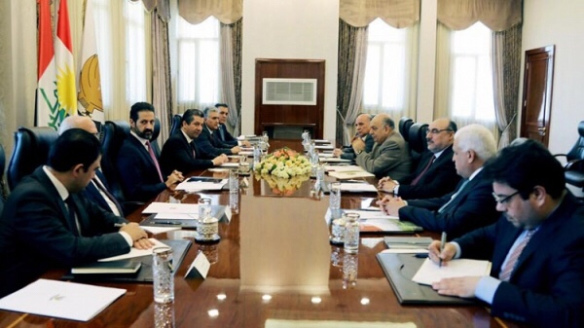Alwaght- While the Iraqi political parties intensify the debates to form a new government, a delegation from Kurdish region in the north of the country has visited Baghdad.
According to the autonomous region’s sources, the delegation includes Finance Minister Awat Sheikh Janab, Head of Council of KRG Ministers Omid Sabah, and Deputy Head of Council of KRG Ministers Amanj Rahim, Interior Minister Khaled Shawani, and Minister of Planning Dara Rashid.
The political visit comes amid reports that a majority of Iraqi parties do not rule out early holding of the parliament session to give the Prime Minister-designate Mostafa al-Kadhimi the vote of confidence.
According to Kurdish sources, the delegation will meet the resigned PM Adel Abdul Mahdi, al-Kadhimi, and the oil and electricity ministers.
The visit raises an important question: What is the main drive behind it?
Discussing oil
Amid the global oil prices’ free fall and while the coronavirus outbreak has put heavy expenses on the governments in Baghdad and Erbil, the first and perhaps the most important topic of discussion in the capital is oil.
On the one side, the Kurds have reached a partial deal with Abdul Mahdi over the transit of the Kirkuk oil and the Kurdistan Regional Government’s share from the autonomous region’s oil sales. The KRG officials want to save this deal in any way. On the other hand, the oil price has reached the lowest rate in two decades and this can cause serious economic troubles for both sides. So, the Kurdish politicians seek to discuss oil with the new PM.
The Iraqi central government since 2003 has been protesting the KRG’s oil contracts with various foreign companies. It denies the right for the Erbil government to sell its oil independently. But the Kurds insist that they should be given to some extent the authority to sell the oil produced in areas under their administration. Various governments talked oil and partial agreements were reached but an ultimate oil deal is yet out of sight.
Budget and bilateral trade
Another topic of discussion with Baghdad is the Kurdish share from Iraq’s national budget. Fars Isa, the head of the KRG’s representation office in Baghdad, commented on the goals behind the trip. He added that the country’s 2020 budget is not finalized yet and the demands of the protestors and Kurds should be included in its finalized version.
The tensions between the central government and the autonomous region started after 2005, the year Baghdad determined that 17 percent of the overall national budget is the Erbil’s share. Arab political parties protested the share and pressed for decreasing it to 13 percent. A failure to reach an oil deal in 2013 motivated Baghdad to cut off the KRG budget. This situation lasted until 2018 when Abdul Mahdi restored cash flow to Erbil under a 13-percent share.
Now Erbil delegation wants to secure a guarantee from the new PM about the continuation of the budget share pay in the future. They also want to seal a deal with al-Kadhimi over the 2020 budget.
Discussing and solving unsolved differences between Baghdad and Erbil
The Kurdish delegation intends to negotiate the security and political issues that remain unsolved for years before the new cabinet starts its job. The two sides have levels of unsettled legal and security issues, remaining since 2005 when a new government followed the rule of Baathist regime. Implementation of article 140 of the constitution which addresses the “disputed regions” in Nineveh, Kirkuk, Diyala, and Salahaddin provinces will be also a key topic the Kurdish officials will negotiate in Baghdad.



























